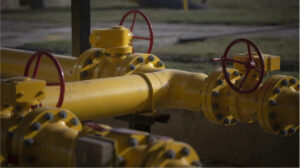
Naftogaz Group has attracted a UAH 4.7 billion loan from PrivatBank to fill its underground gas storage facilities with the required volumes of gas, said Serhiy Koretsky, Chairman of the Board of Naftogaz of Ukraine Sergiy Koretsky.
“Naftogaz Group has attracted a UAH 4.7 billion loan from PrivatBank. The funds were used to build up the necessary gas reserves in underground storage facilities for a sustainable heating season,” Koretsky wrote on Facebook on Wednesday.
He noted that cooperation with international financial organizations and partner countries is ongoing.
“I am grateful to the management of PrivatBank for the quick response to our request. I thank the Government for supporting our efforts to prepare for the winter,” said the head of Naftogaz.
The company indicated that it is diversifying sources and routes of gas supply to increase Ukraine’s energy security and resilience in a full-scale war.
As reported, in the spring of 2025, Naftogaz announced its intention to use a EUR 270 million loan from the European Bank for Reconstruction and Development (EBRD) and EUR 140 million in grant funding provided by the Norwegian government through the NORAD fund for the urgent purchase of 1 billion cubic meters of gas. The company has also contracted 440 million cubic meters of liquefied natural gas (LNG) from the Polish concern ORLEN.

Ukrainian President Volodymyr Zelensky has appointed Hennadiy Nadolenko as Ukraine’s ambassador extraordinary and plenipotentiary to Malaysia. The relevant decree No. 526/2025 has been published on the website of the head of state.
Prior to this appointment, Nadolenko served as director of the Diplomatic Academy of Ukraine under the Ministry of Foreign Affairs and has significant diplomatic experience. He also previously represented Ukraine in the Middle East: from 2007 to 2021, he was Ukraine’s ambassador to the State of Israel, and in the 2000s, he served in Turkey.
Hennadii Nadolenko was born in 1960, graduated from Taras Shevchenko National University of Kyiv and the Diplomatic Academy. He has served in the diplomatic service since the 1990s and holds the rank of ambassador extraordinary and plenipotentiary.
Diplomatic relations between Ukraine and Malaysia were established in 1992. The Ukrainian Embassy has been operating in Kuala Lumpur since 2004.
Malaysia is an important partner for Ukraine in Southeast Asia, especially in the areas of trade, education, and international security.

Ukrainian businessman Sergiy Tigipko’s Dnipro-based Dneprometiz-TAS LLC plans to build a new hot-dip galvanizing line for steel wire worth $4 million, the company presented the project at the Ukraine Recovery Conference (URC2025) held in Rome on July 10-12.
According to the company’s information in the URC project catalog, the project involves the construction of a new hot-dip galvanizing line to improve operational efficiency and optimize energy consumption, and is a diversification of high-margin products through the production of high-quality thin (0.7-1.6 mm) and medium-diameter (1.8-5.0 mm) wire, including low-carbon, medium- and high-carbon steel grades.
The plant’s capacity is 24 thousand tons per year. New energy-saving equipment is used in the furnace and zinc bath. The project’s strengths include reduced production costs, increased space efficiency, increased production capacity, and strategic investments in the cable industry.
The target market is Europe, North America, and the Middle East.
The project is 100% ready for implementation: pre-project planning has been completed, infrastructure (workshop, power plant and other facilities) has been developed, detailed technical, production and market analyses have been performed, and wire semi-finished products are being produced.
The project will result in a change in the product mix from relatively low-margin fence wires to highly profitable products for the cable industry. The model focuses on efficiency through the gradual decommissioning of old lines to achieve an annual production capacity of 24 thousand tons with an average diameter of 1.6 mm.
The total project budget is $4 million, with $2 million to be raised. Expected financial indicators: net present value (NPV) – $1.5 million, revenue in 2030 – $1.4 million, EBITDA in 2030 – $0.9 million.
The project launch period is three years.
Until 2025, $0.1 million will be invested in the concept development, this year $1.5 million will be needed for design, $2 million in 2026, and $0.4 million for construction in 2027. The start of operation is scheduled for 2027.
It is added that cooperation has already been established with partners in the EU and potential customers in MENA and North America.
As reported, Dneprometiz-TAS increased its net profit by 20.8% year-on-year to UAH 8.936 million in the first half of 2025, while net income increased by 8% to UAH 1 billion 756.245 million.
“In 2024, Dneprometiz-TAS increased its net profit by 47.7% compared to 2023, to UAH 14.197 million from UAH 9.610 million, and net income by 22.7%, to UAH 3 billion 285.688 million. At the same time, the company’s retained earnings amounted to UAH 263.048 million at the end of 2024.
“Dneprometiz-TAS produces hardware products from low-carbon steels. The company’s capacity is 120 thousand tons of products per year.
It is owned by T.A.S. Overseas Investments Limited (Cyprus) owns 98.6578 percent of Dneprometiz LLC.
The authorized capital of Dneprometiz-TAS LLC is UAH 83.480 million.

Black Sabbath frontman Ozzy Osbourne has died, Sky News reports.
He was 76 years old.
A statement from his family said he died “surrounded by love.”
Three weeks ago, Osbourne played his farewell concert with Black Sabbath at a festival in Birmingham, UK (video). The band reunited for the first time in 20 years for this concert.
Six years ago, the musician was diagnosed with Parkinson’s disease.

Decree No. 529/2025 appointed Andriy Plakhotniuk Ambassador Extraordinary and Plenipotentiary of Ukraine to Canada and Permanent Representative to the International Civil Aviation Organization (ICAO).
Prior to this appointment, Mr. Plakhotniuk served as Ambassador Extraordinary and Plenipotentiary of Ukraine to Sweden since 2021. Previously, he worked in the Ministry of Foreign Affairs of Ukraine, in particular in the Department of International Organizations and embassies abroad.
He holds a PhD in Political Science and is fluent in several foreign languages. Andriy Plakhotniuk is known for his active position in promoting Ukraine’s Euro-Atlantic integration and strengthening bilateral cooperation in defense and high technology.
Diplomatic relations between Ukraine and Canada were established on January 27, 1992.
Ukraine has one of the largest Ukrainian embassies in the world in Canada, and more than 1.3 million Ukrainians and their descendants live in the country.

Foreigners’ interest in purchasing premium housing in Ukraine for investment purposes is gradually recovering, developers told Interfax-Ukraine.
“Interest from foreign citizens has recovered, and in some cases, such as our projects, the number of deals with foreigners exceeds the number of deals with Ukrainians. Our clients include Spaniards, Japanese, Canadians, and others who are investing in business and premium class properties with a clear focus on the future. They see potential in both long-term rentals and growth in value,” said Irina Mikhaleva, CMO of Alliance Novobud.
According to Susanna Karakhanian, sales director at Greenville, foreign clients are considering both investment purchases and homes for themselves, but are postponing their purchases until safer times.
“Interest from non-residents has partially recovered recently. We are seeing a trend where foreigners regularly visit apartments, but are not buying yet — deferred demand, waiting for stabilization in Ukraine,” she explained.
Although the apartments of the Odessa developer “Two Academics” are mainly purchased by local residents (up to 60% of customers), the share of deals with foreign investors has increased over the past year and a half, the company said.
“In terms of geography, 55-60% are local residents, in our case Odessa. Up to 30% are from other cities in Ukraine. However, over the past year, these figures have begun to change with the emergence of foreign investors. For the period 2024-2025, 35% of deals are being made with foreign investors: the UAE, Slovakia, Turkey, Italy, the US, Greece, Israel, and Romania,” said Maxim Odintsov, development director of the construction company Dva Akademika.
In addition, foreigners continue to show interest in Ukrainian residential projects where foreign companies are involved as partners, according to RIEL.
“We have projects that foreigners are quite interested in. For example, Maxima Residence has traditionally attracted foreigners, particularly Turkish citizens. This is because it is a joint project between RIEL and Turkish developer Bosphorus Development,” explained Zoryana Zemlinska, sales coordinator at RIEL in Kyiv.
At the same time, KAN Development noted that the share of foreigners among buyers remains insignificant, and demand for premium housing is largely recovering due to people who invested before the war.
“The share of foreigners among buyers remains insignificant. These are mainly those who are considering investing with the expectation of a minimal cost of entry into the market,” the developer’s press service said in response to a request from Interfax-Ukraine.
According to Alexander Nasikovsky, managing partner of the DIM group of companies, Ukrainians who have been living abroad for a long time have appeared in the structure of demand for premium housing.
“We are observing the following trend: some buyers who have free funds are deliberately not taking them abroad, but are ‘parking’ them in real estate with a view to future price growth and preservation of asset value. As for foreign citizens, we do not see any activity on their part for reasons that are understandable to everyone. However, there is a small share of Ukrainians who have been living abroad for a long time,” the businessman noted.